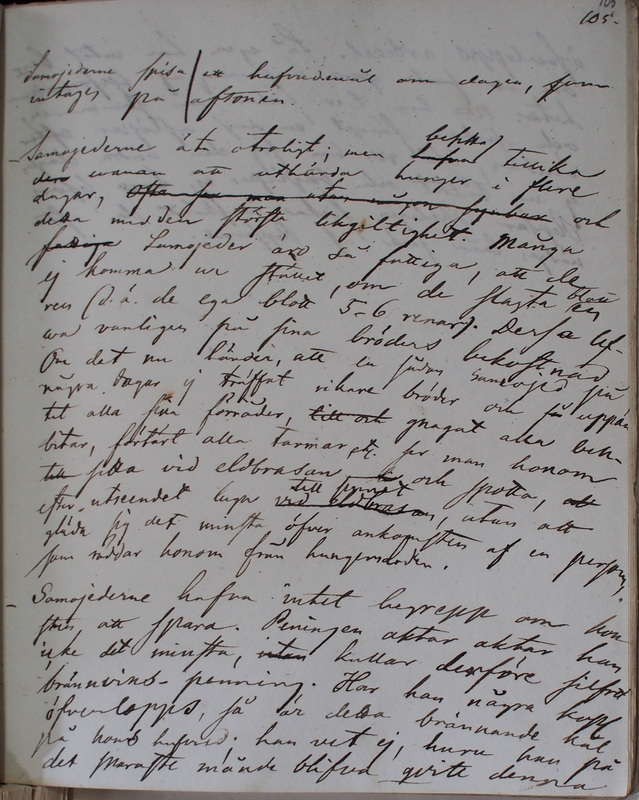Ethnographiska, historiska och statistiska anmärkningar. 105
Title
Description
| Samojederne spisa ett
hufvudmål
om dagen, som[påkommer]
intäges på aftonen. |
The Samoyeds eat one main meal a day, which is in the evening. |
| Samojederne äta otroligt; men besitta tillika der wanan att uthärda hunger i flere dagar. Ofta ser man utan någon synbar och detta med den största likgiltighet. Många fattiga Samojeder äro så fattiga, att de ej komma ur stället, om de slagta blott en ren (d.ä. de ega blott 5-6 renar). Dessa lef- wa vanligen på sina bröders bekostnad. Om det nu händer, att en sådan Samojed på några dagar ej träffat rikare bröder och så uppä- tit alla sina förråder, till och gnagat alla ben- bitar, förtärt alla tarmar etc. ser man honom till sitta vid eldbrasan och spotta efter utseendet luga vid eldbrasan till synnet, utan att gläda sig det minsta öfver ankomsten af en person som räddar honom från hungerdöden. |
The Samoyeds eat unbelievably much; but they can also endure hunger for several days and with the greatest indifference. Many Samoyeds are so poor that they would not manage if they slaughtered only one reindeer (i.e. they own only five or six reindeer). These usually live at the expense of their brothers. If it happens that such a Samoyed did not meet his richer brothers for few days and ate all his supplies, gnawed all the bones, consumed all the intestines, etc., you could see him sitting by the fire and spitting calmly, without rejoicing in the least over the arrival of a person who saves him from starvation. |
|
Samojederne hafva intet
begrepp om kons-Here, Castrén comes close to other 19th-century researchers or travellers describing northern peoples as “short-sighted, carefree, indifferent, slow, sluggish, clumsy, and gluttonous people who live for the moment”. (Leete 2014: 141) As noted by Leete (2014: 143), the description is based on ideas related to primitive peoples and their mindset and on theories about the impact of the environment on culture.
ten att spara. Peningen aktar aktar han icke det minsta, utan kallas derföre silfvret brännvins-penning. Har han några kopp. öfverlopps, så är detta brännande käl på hans hufvud; han vet ej, huru han på det snaraste månde blifva qvitt denna |
The Samoyed has no idea of saving. He does not check money in the slightest, and therefore he calls silver “brandy money”. If he has a few spare kopecks, he tries to find a way to get rid of this |

